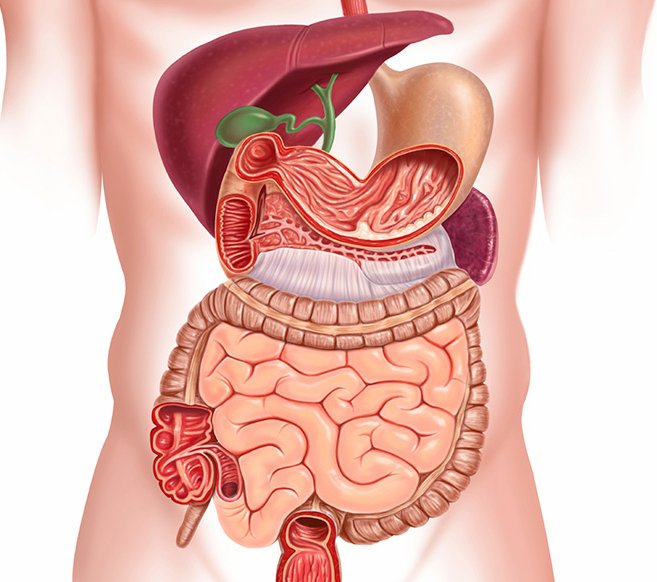
effect on body part
- Digestive System
- Life-threatening illnesses
- Gallbladder
- Liver
What are Gastroenterology Diseases ?
Gastroenterology diseases encompass a broad spectrum of conditions affecting the digestive system, ranging from minor discomforts to severe, life-threatening illnesses. These disorders can impact various organs within the gastrointestinal tract, including the esophagus, stomach, small intestine, large intestine, liver, gallbladder, and pancreas. Understanding the causes, taking precautions, and seeking timely solutions are essential for managing and mitigating the impact of these diseases on overall health and well-being.
Diagnosis and treatment of gastroenterology diseases often require a multidisciplinary approach involving gastroenterologists, dietitians, surgeons, and other specialists. Diagnostic procedures such as endoscopy, colonoscopy, imaging studies, and blood tests help identify the underlying cause of symptoms. Treatment plans are tailored to the individual and may include lifestyle modifications, medication, dietary changes, and in some cases, surgical intervention. The goal of treatment is to alleviate symptoms, manage the disease, prevent complications, and improve overall well-being. Additionally, ongoing monitoring and follow-up care are essential to ensure the effectiveness of treatment and address any changes in the condition over time.

effect on body part
- Digestive System
- Life-threatening illnesses
- Gallbladder
- Liver
What are Gastroenterology Diseases ?
Gastroenterology diseases encompass a broad spectrum of conditions affecting the digestive system, ranging from minor discomforts to severe, life-threatening illnesses. These disorders can impact various organs within the gastrointestinal tract, including the esophagus, stomach, small intestine, large intestine, liver, gallbladder, and pancreas. Understanding the causes, taking precautions, and seeking timely solutions are essential for managing and mitigating the impact of these diseases on overall health and well-being.
Diagnosis and treatment of gastroenterology diseases often require a multidisciplinary approach involving gastroenterologists, dietitians, surgeons, and other specialists. Diagnostic procedures such as endoscopy, colonoscopy, imaging studies, and blood tests help identify the underlying cause of symptoms. Treatment plans are tailored to the individual and may include lifestyle modifications, medication, dietary changes, and in some cases, surgical intervention. The goal of treatment is to alleviate symptoms, manage the disease, prevent complications, and improve overall well-being. Additionally, ongoing monitoring and follow-up care are essential to ensure the effectiveness of treatment and address any changes in the condition over time.
Types Of Gastroenterology Diseases
Gastroesophageal Reflux Disease (GERD)
GERD is a chronic condition where stomach acid flows back into the esophagus, causing symptoms like heartburn, chest pain, and difficulty swallowing. It can lead to complications such as esophagitis and Barrett’s esophagus if left untreated.
Inflammatory Bowel Disease (IBD)
IBD encompasses conditions like Crohn’s disease and ulcerative colitis, characterized by chronic inflammation of the digestive tract. Symptoms include abdominal pain, diarrhea, rectal bleeding, fatigue, and weight loss. IBD can lead to complications such as bowel strictures, fistulas, and increased risk of colon cancer.
Irritable Bowel Syndrome (IBS)
IBS is a functional gastrointestinal disorder characterized by abdominal pain, bloating, and changes in bowel habits without evidence of underlying structural abnormalities. Triggers may include certain foods, stress, hormonal changes, and gut microbiota imbalance.
Peptic Ulcer Disease
Peptic ulcers are sores that develop on the lining of the stomach, small intestine, or esophagus due to imbalance between stomach acid and protective factors. Symptoms include abdominal pain, bloating, nausea, and vomiting. Helicobacter pylori infection and long-term use of NSAIDs are common causes.
Types Of Gastroenterology Diseases
Gastroesophageal Reflux Disease (GERD)
GERD is a chronic condition where stomach acid flows back into the esophagus, causing symptoms like heartburn, chest pain, and difficulty swallowing. It can lead to complications such as esophagitis and Barrett’s esophagus if left untreated.
Inflammatory Bowel Disease (IBD)
IBD encompasses conditions like Crohn’s disease and ulcerative colitis, characterized by chronic inflammation of the digestive tract. Symptoms include abdominal pain, diarrhea, rectal bleeding, fatigue, and weight loss. IBD can lead to complications such as bowel strictures, fistulas, and increased risk of colon cancer.
Irritable Bowel Syndrome (IBS)
IBS is a functional gastrointestinal disorder characterized by abdominal pain, bloating, and changes in bowel habits without evidence of underlying structural abnormalities. Triggers may include certain foods, stress, hormonal changes, and gut microbiota imbalance.
Peptic Ulcer Disease
Peptic ulcers are sores that develop on the lining of the stomach, small intestine, or esophagus due to imbalance between stomach acid and protective factors. Symptoms include abdominal pain, bloating, nausea, and vomiting. Helicobacter pylori infection and long-term use of NSAIDs are common causes.
Your trusted destination for comprehensive care and management of gastroenterology diseases
Your trusted destination for comprehensive care and management of gastroenterology diseases
Treatment Approaches at Gastroworld Clinic
Comprehensive Consultation
Each patient undergoes a thorough evaluation to understand their medical history, symptoms, and concerns, guiding personalized treatment plans.
Endoscopic Procedures
We utilize state-of-the-art endoscopic techniques for diagnostic evaluation, therapeutic interventions, and minimally invasive treatments.
Medication Management
Gastroworld Clinic tailored medication regimens are prescribed to manage symptoms, control inflammation, and prevent disease progression.
Nutritional Counseling
Our Clinic registered dietitians provide individualized nutrition plans to optimize digestive health and support patients in managing specific dietary requirements.
Lifestyle Modifications
We emphasize the importance of lifestyle changes, including dietary modifications, stress management, regular exercise, and smoking cessation, to improve overall health.
Surgical Intervention
When necessary, our Gastroworld Clinic experienced surgeons team perform advanced surgical procedures to address gastrointestinal conditions and improve quality of life for our patients.
Treatment Approaches at Gastroworld Clinic
Comprehensive Consultation
Each patient undergoes a thorough evaluation to understand their medical history, symptoms, and concerns, guiding personalized treatment plans.
Endoscopic Procedures
We utilize state-of-the-art endoscopic techniques for diagnostic evaluation, therapeutic interventions, and minimally invasive treatments.
Medication Management
Gastroworld Clinic tailored medication regimens are prescribed to manage symptoms, control inflammation, and prevent disease progression.
Nutritional Counseling
Our Clinic registered dietitians provide individualized nutrition plans to optimize digestive health and support patients in managing specific dietary requirements.
Lifestyle Modifications
We emphasize the importance of lifestyle changes, including dietary modifications, stress management, regular exercise, and smoking cessation, to improve overall health.
Surgical Intervention
When necessary, our Gastroworld Clinic experienced surgeons team perform advanced surgical procedures to address gastrointestinal conditions and improve quality of life for our patients.
Frequently Asked Questions
What are the common symptoms of gastroenterology diseases?
Common symptoms include abdominal pain, bloating, diarrhea, constipation, nausea, vomiting, acid reflux, and blood in stool.
Are gastroenterology diseases preventable?
While some factors like genetics cannot be changed, adopting a healthy lifestyle, maintaining a balanced diet, staying hydrated, and practicing good hygiene can help prevent certain gastrointestinal diseases.
What diagnostic tests are used to evaluate gastroenterology diseases?
Diagnostic tests may include blood tests, imaging studies (e.g., ultrasound, MRI), endoscopic procedures (e.g., colonoscopy, upper endoscopy), and biopsy for histological examination.
Can lifestyle changes help manage gastroenterology diseases?
Yes, adopting a healthy lifestyle, including dietary modifications, regular exercise, stress management, and smoking cessation, can help manage symptoms and improve outcomes for many gastrointestinal conditions.
What are the treatment options for gastroenterology diseases?
Treatment options may include medications (e.g., antibiotics, immunosuppressants), dietary modifications, lifestyle changes, procedures (e.g., endoscopy, surgery), and supportive care tailored to the specific condition and individual needs.
